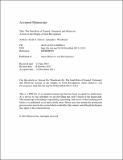Files in this item
The joint role of trained, untrained, and observed actions at the origins of goal recognition
Item metadata
| dc.contributor.author | Gerson, Sarah | |
| dc.contributor.author | Woodward, Amanda | |
| dc.date.accessioned | 2016-01-25T00:12:10Z | |
| dc.date.available | 2016-01-25T00:12:10Z | |
| dc.date.issued | 2014-02 | |
| dc.identifier | 162014168 | |
| dc.identifier | c80812e1-409b-4a56-8492-671a4ffa88a3 | |
| dc.identifier | 84893000802 | |
| dc.identifier.citation | Gerson , S & Woodward , A 2014 , ' The joint role of trained, untrained, and observed actions at the origins of goal recognition ' , Infant Behavior and Development , vol. 37 , no. 1 , pp. 94-104 . https://doi.org/10.1016/j.infbeh.2013.12.013 | en |
| dc.identifier.issn | 0163-6383 | |
| dc.identifier.uri | https://hdl.handle.net/10023/8066 | |
| dc.description.abstract | Recent findings across a variety of domains reveal the benefits of self-produced experience on object exploration, object knowledge, attention, and action perception. The influence of active experience may be particularly important in infancy, when motor development is undergoing great changes. Despite the importance of self-produced experience, we know that infants and young children are eventually able to gain knowledge through purely observational experience. In the current work, three-month-old infants were given experience with object-directed actions in one of three forms and their recognition of the goal of grasping actions was then assessed in a habituation paradigm. All infants were given the chance to manually interact with the toys without assistance (a difficult task for most three-month-olds). Two of the three groups were then given additional experience with object-directed actions, either through active training (in which Velcro mittens helped infants act more efficiently) or observational training. Findings support the conclusion that self-produced experience is uniquely informative for action perception and suggest that individual differences in spontaneous motor activity may interact with observational experience to inform action perception early in life. | |
| dc.format.extent | 625604 | |
| dc.language.iso | eng | |
| dc.relation.ispartof | Infant Behavior and Development | en |
| dc.subject | Active experience | en |
| dc.subject | Observational experience | en |
| dc.subject | Action understanding | en |
| dc.subject | Social cognition | en |
| dc.subject | Infancy | en |
| dc.subject | BF Psychology | en |
| dc.subject.lcc | BF | en |
| dc.title | The joint role of trained, untrained, and observed actions at the origins of goal recognition | en |
| dc.type | Journal article | en |
| dc.contributor.institution | University of St Andrews. School of Psychology and Neuroscience | en |
| dc.identifier.doi | https://doi.org/10.1016/j.infbeh.2013.12.013 | |
| dc.description.status | Peer reviewed | en |
| dc.date.embargoedUntil | 2016-01-25 |
This item appears in the following Collection(s)
Items in the St Andrews Research Repository are protected by copyright, with all rights reserved, unless otherwise indicated.

